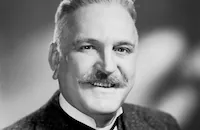Success at Any Price

Brief Synopsis
Cast & Crew
J. Walter Ruben
Douglas Fairbanks
Genevieve Tobin
Frank Morgan
Colleen Moore
Edward Everett Horton
Film Details
Technical Specs

Synopsis
Shortly before the stock market crash of 1929, Joe Martin, the tough-talking brother of a slain East Side gangster who believes that money is everything, gets a job as an assistant clerk in the advertising agency where his girl friend, Sarah Griswold, works. Joe's abrasive, aggressive office manner alienates him from his college-educated bosses and eventually causes his firing. Convinced of Joe's essential goodness, Sarah pleads his case to her superior, Raymond Merritt, who agrees to give Joe another chance by allowing him to write the copy for a Glamour Creme ad spread. That night, while toiling over his assignment in Merritt's office, Joe meets Agnes Carter, Merritt's longtime mistress, whose elegant charm dazzles the would-be millionaire. Determined to win her from Merritt, Joe, whose ads land him an instant promotion, toils to make money and advance himself in the company, all but abandoning Sarah. After the market crash, Joe learns that Merritt has been forced to take out personal bank notes to stay afloat, and freely divulges this information to Merritt's competitor, Mr. Hatfield. Because of his clever insider investing, Joe earns his million dollars and proposes to Agnes. Although she feels incapable of loving Joe, Agnes agrees to marry him, but soon grows bored with her ambitious, neglectful husband and spends less and less time at home. Joe, meanwhile, as a final coup d'etat , buys up Merritt's personal notes and forces him to resign from the agency, then appoints himself as its head. Once at the top, however, Joe learns from a private detective that Agnes is having an affair with Hatfield and finally understands that he will never possess what others have, namely happiness through love and children. Devastated by this self-realization, Joe shoots himself, but is rescued by Sarah, who, seeing the depth of his desperation, vows to love and care for him.

Director
J. Walter Ruben
Cast

Douglas Fairbanks

Genevieve Tobin

Frank Morgan

Colleen Moore

Edward Everett Horton
Nydia Westman
Allen Vincent

Henry Kolker
Crew
Merian C. Cooper
Doran Cox
Henry W. Gerrard
Howard J. Green
Al Herman
Jack Hively
John Howard Lawson
Van Nest Polglase
Max Steiner
H. N. Swanson
John E. Tribby

Film Details
Technical Specs

Articles
Success at Any Price -
By Glenn Erickson

Success at Any Price -
Quotes
Trivia
Notes
The working title of this film was Success Story. In John Howard Lawson's stage play, the Joe Martin character was portrayed as a Jewish American who resented working in a gentile's business, but this ethnic conflict was not used in the film. In September 1933, Film Daily announced that Lawson's play had been bought by RKO as a starring vehicle for William Gargan and Wynne Gibson. A Hollywood Reporter production chart adds June Brewster and Howard Wilson to the cast, but their participation in the final film has not been confirmed.














